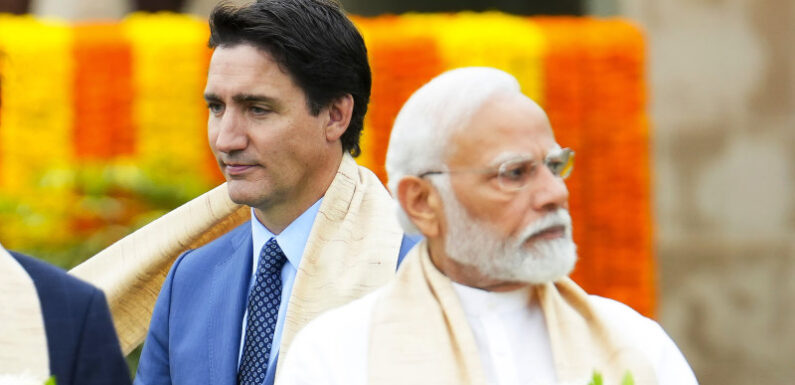
Save articles for later
Add articles to your saved list and come back to them any time.
Washington: American spy agencies provided information to Ottawa, Ontario, after the killing of a Sikh separatist leader in the Vancouver area, but Canada developed the most definitive intelligence that led it to accuse India of orchestrating the plot, according to Western allied officials.
In the aftermath of the killing, US intelligence agencies offered their Canadian counterparts context that helped Canada conclude that India had been involved. Yet what appears to be the “smoking gun,” intercepted communications of Indian diplomats in Canada indicating involvement in the plot, was gathered by Canadian officials, allied officials said.
Canada’s Prime Minister Justin Trudeau, left, walks past Indian Prime Minister Narendra Modi as they take part in a wreath-laying ceremony at Raj Ghat, Mahatma Gandhi’s cremation site, during the G20 Summit earlier this month.Credit: AP
While US Secretary of State Antony Blinken has called on India to cooperate with the Canadian investigation, US officials have largely tried to avoid triggering any diplomatic blowback from India. But the disclosure of the involvement of US intelligence risks ensnaring Washington in the diplomatic battle between Canada and India at a time when it is keen to develop New Delhi as a closer partner.
The United States did not learn about the plot, or evidence pointing to India’s involvement in it, until after operatives had killed the Sikh leader, Hardeep Singh Nijjar, allied officials said.
Two men fatally shot Nijjar, a Canadian citizen who had advocated independence for a Sikh-majority region of India, in the Vancouver area on June 18.
Before the killing, Canadian officials had told Nijjar that he was in danger. Several friends and associates of Nijjar said that he had been warned repeatedly about threats against him and had been cautioned to avoid the temple.
After his death, US officials told their Canadian counterparts that Washington had not had any advance information about the plot, and that if US officials had they would have immediately informed Ottawa under the intelligence agencies’ “duty to warn” doctrine, according to two allied officials.
The officials, who spoke on the condition of anonymity to discuss what has become a diplomatic firestorm, said Canadian officials had offered a general warning to Nijjar but had not told him that he was the target of an Indian government plot.
The United States routinely, and automatically, shares huge amounts of intercepted communications with its closest intelligence partners, including Canada. But the contextual information about the killing was shared deliberately as part of a package of various intelligence streams.
A spokesperson for the White House declined to comment. US officials were reluctant to discuss the killing because although Washington wants to assist Canada, a close ally, it does not want to alienate India, a partner with which it is hoping to expand ties as a counterbalance to China’s rising influence in Asia.
The accusation has created a diplomatic rift between Ottawa and New Delhi, leading each to expel the other’s intelligence officers and India to suspend visas for Canadians.
Nevertheless, the killing, and the alleged involvement of the Indian government, has shocked officials in Washington. While democratic countries conduct targeted killings in unstable countries or regions and the spy services of more authoritarian governments — namely Russia — orchestrate assassinations anywhere they choose, it is extraordinarily rare for a democratic country to conduct a lethal covert action in another democracy.
Prime Minister Justin Trudeau and Canadian officials have declined to release the specifics of the intelligence Canada has gathered about India. Canadian officials say it is important not to compromise the Royal Canadian Mounted Police’s investigation of the killing.
Allied officials would not describe in detail the intelligence shared by the United States.
A Canadian government official, who spoke on the condition of anonymity to discuss sensitive information, said the government had received intelligence from multiple countries.
The Canadian Broadcasting Corporation earlier reported that the Canadian government had gathered communications of Indian diplomats in Canada.
This article originally appeared in The New York Times.
Most Viewed in World
From our partners
Source: Read Full Article
